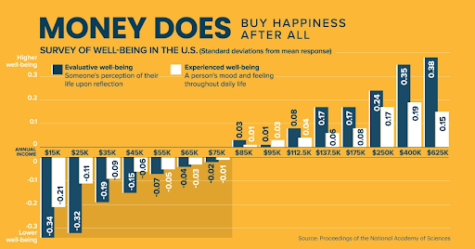Happiness vs. Money

(Photo Source: PEXELS)
October 26, 2022
“Money doesn’t buy happiness”. Or does it? Yachts, mansions, vacations, clothes, food, anything you could imagine. But would you be willing to sacrifice your wellbeing to get there? Stress, unhappiness, debt, for money?
As humans, we desire the most; a life of luxury, our wildest dreams. Many of us view a successful career as one that brings us the most material prosperity. It’s often not enough just to do something we enjoy; we have this desire, a thirst, to live in excess. On the other hand, is it truly worth breaking yourself to ensure wealth? For many, guaranteed wealth is well worth the temporary distress. For others, the potential for long term detriment from stress can never be compensated with money.
Money Comes First
When asked if money or happiness was the greater priority when looking at a career path, the general consensus was that they go hand in hand.
“A balance of both I guess,” comments Sage Smith, a senior at Pentucket. “I definitely think that happiness comes with having money.”
“Even though people say money can’t buy happiness, it can buy a lot of opportunity which can bring happiness,” adds sophomore Vivian Rizzo.
A recent study found that happiness increases linearly with reported income, as shown in the chart.

Psychologists Ed Deiner and Robert Biswas-Diener would agree, to a point, “Rich people and nations are happier than their poor counterparts”. However, they note that while more money may lessen financial stress and improve feelings of fulfillment, it can actually make people miserable as spending habits increase and reach the point of overconsumption.
Laura White, a Pentucket parent, agrees, “Making a lot of money, like so much money that you don’t have those kinds of issues, then you have excess where you can just spend money on things you don’t need, and it’s like an absence of value.”
However, Smith adds another valid factor, “There is a pretty big pressure on students to enter a career that makes more money.”
Many high school and college students are urged to decide a major early on. When going through, they have to take into account how successful a certain career may be; whether they will be doing something they actually enjoy for the rest of their lives and whether they will be able to make a decent living off it. That is another thing.

Rizzo says, “Think about the things you enjoy, do you think that could be a sustainable career? It’s just trying to find something that would be the most sustainable.”
“Obviously you want a job that’s less stressful where you’re making good money, but I don’t know if everyone would sacrifice making good money to be in a position where you’re not stressed,” contributes Smith. “I think money is one of the things I most stress about now even being in high school. But in the future too, that’s all I’m going to be living off of. Not having my parents and their financial support, money is going to be a huge stressor.”
But Rizzo lends a great point, “Why should we have to do something that makes us miserable in order to keep living? Sometimes if you’re doing something you like, you end up sacrificing a lot of your other needs. Like you’re super happy in your job but you can’t even pay rent, or buy food for your family. Then what’s the point of the happiness the job brings you?”

At that, White asserts, “What is happiness? Like what are the things that make you happy?”
Happiness Comes First
When asked if happiness or money was a greater factor in choosing her career, White answered, “Happiness. Seeing my parents being not really happy with the work they were doing, I wanted to follow what I enjoyed doing to have a more fulfilling work experience.”
She added, “You can have all the money and not a lot of happiness. You can also not have a lot of money and have a happy life.”
Like many young adults, White aspired to follow her passions in life, seeking to be happy above all else. For her, those passions were art, expression, and creativity.
“I trained as a fine artist, but how do you make money in fine art?”
As Rizzo mentioned, the sustainability of a career is a huge factor, and realistically you have to find something that you not only enjoy, but that also has the ability to support your own life and potentially even an entire family.
“In order to make money I just had to get a job,” recalls White, “I went to a temp agency and the first place I went to I ended up staying since all my job experience was there.”
In her case, White had to give up the career that made her happy in order to simply make a living, and eventually support a family of five. Her years in college and her degree in fine arts were left behind.
She adds, “In my last job I was offered the management role, so I was like ‘This is great, I’m moving up, I’m advancing,’ and that’s what I wanted, but it wasn’t my dream to be a manager for an electrical distributor, like who cares? In that role I was succeeding but that wasn’t my dream. But that role? I don’t really care about that.”
This is a truth for many people today. Giving up one’s dreams to pursue an office job simply for the stability and financial support of it happens quite often. Unfortunately, it can be difficult to make a good living off of a true passion.
Balance
The majority of Americans fall in the middle class, which arguably deals with the most amount of stress, both financially and at the workplace. With the financial burdens of housing, raising children, paying for college, and perpetual debt, many middle-class families find themselves stuck paying more than their salaries allow and consequently facing more stress at work as they struggle with increasing debt and a stagnant income.

But choosing a livelihood is not always about the money.
“Ultimately it sort of depends on your lifestyle. Some people would be happy just to meet their cost of living as long as they really enjoyed their job. Others might want to satisfy more material desires and would put themselves in a higher stress job to do so,” says Rizzo.

White maintains, in the end, “Life is happening like right now, today, this moment. You can’t be like ‘Oh I’ll be happy when I achieve this’ or ‘I’ll be happy at some point in the future once I cross all the things off my list’. Well that time never comes because after everything you accomplish you still want more. It’s like the trick is to be present in the moment because now is what life is, it’s happening now. I would say it’s a journey, and I think that’s the challenge, to have gratitude and to always be grateful for the things that you do have.”
Only you can decide what the future holds.


Ella Borrelli • Nov 21, 2022 at 11:43 am
This is such a well written article! As all us seniors are now put in the position of thinking what we want to do with are lives a main factory for many of us is salary. I find myself researching things I am interested and their salary. My want to have an extravagant life style is achievable but at what cost. I do not believe money buys happiness but it buys experience and a better life that causes happiness.
Sam Dasilva • Nov 1, 2022 at 9:23 pm
I feel as though money is stereotyped to have such valuable worth rather than what it actually is. Money towers over the point of being happy because most things in our daily life are purchased either with great amounts of money such as our phones and valuables. But the real question is, are you even happy with the purchases you spent? It’s almost as though money is used for instant satisfaction. But I think that you target the main points of the happiness vs. money aspect. Very nice job.
Kaiden Currie • Oct 31, 2022 at 8:16 am
This is such a relatable article. The topic of picking a profession is something that I feel related to. You talked how some people are driven by money and they pick their job based off of how much money they earn vs people picking their jobs based off of happiness. I want to go into dance as a profession and many people are skeptical or say that it does not pay well. At some points I had doubts of what I wanted to go into as a profession because I was afraid of the money aspect. But reading this article justifies and solidifies my ideas of what I want to do in my future.